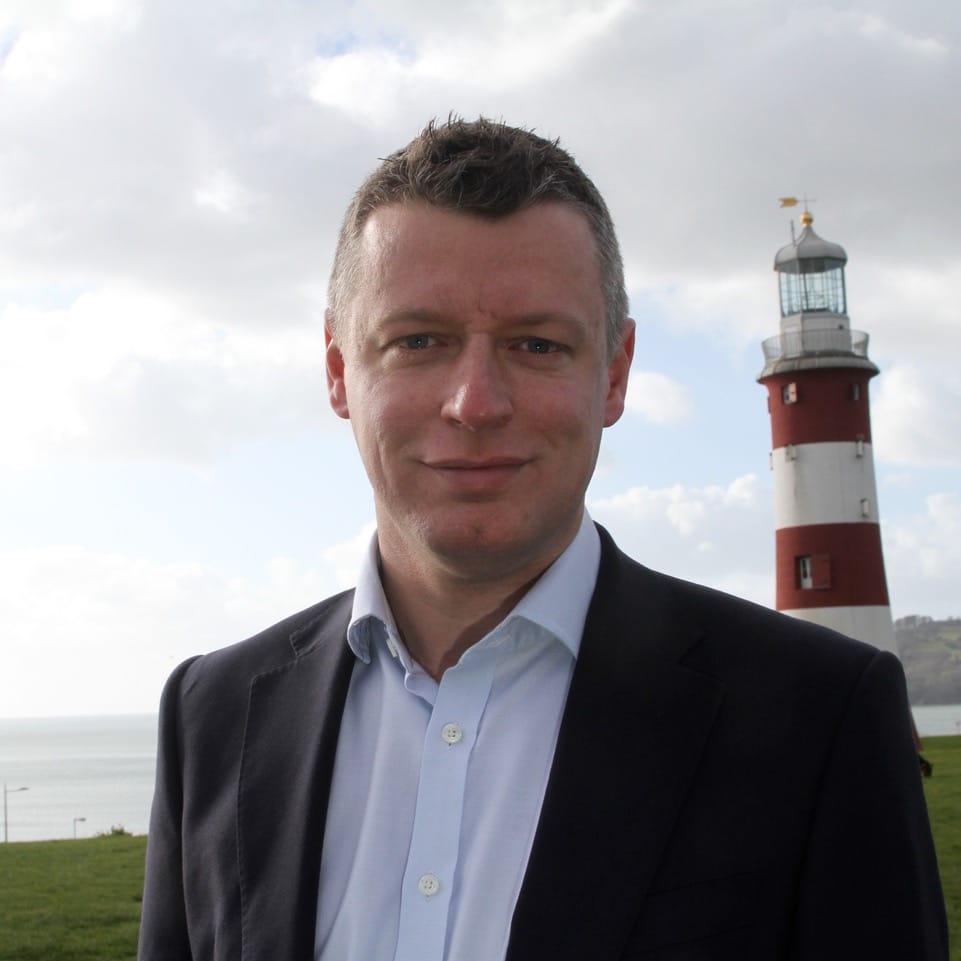News
Interview: Luke Pollard, MP for Plymouth, talks to Jeff Goodman about the proposed first UK National Marine Park

To date, I have always thought so-called marine protected areas in the UK to be a sham. Poorly regulated and enforced. Could this finally be a change of times? I was delighted to learn about the proposal for creating the UK’s first National Marine Park in my home counties of Devon and Cornwall. I caught the news recently and heard that initial funding has been awarded. Wonderful!
About Luke Pollard
Luke Pollard was elected as the Labour and Co-operative Member of Parliament for Plymouth Sutton and Devonport in June 2017. Luke was born and lives in Plymouth and is the first MP to be born in Plymouth since Michael Foot represented the city in 1945.
After winning the seat from the Conservatives, Luke was appointed PPS to Shadow Environment Secretary, Sue Hayman MP, before being promoted to Shadow Environment Minister responsible for Water, Flooding, Fishing and Coastal Communities in July this year.
In December 2018 at the University of Plymouth, Luke launched proposals to create the UK’s First National Marine Park (NMP) in Plymouth Sound.
Plymouth Sound is one of the most unique marine environments in the UK. It includes the Plymouth Sound and Tamar Estuaries Marine Protected Area designated for its abundance and diversity of wildlife, the largest naval base in western Europe, a nationally significant fish market, over 13,000 people in Plymouth are employed in the marine sector, it is home to world-class marine research and boasts a rich maritime history. Nowhere in the UK is more deserving of special recognition. Developing a National Marine Park (NMP) here in Plymouth will not only provide a huge local benefit but it will provide a model, which campaigners intend to roll out across coastal communities on a national scale. You can read more about this here.
Jeff: Thanks for taking time out to tell us more about the proposal for the UK’s first National Marine Park and I would like to heartily congratulate you and all the other people and groups involved in devising and moving this project forward.
How, when and why did you first become involved with the project?
Luke: It was just after Theresa May called the snap election in 2017 that I decided to make campaigning for the UK’s National Marine Park to be one of my key campaign pledges. Labour was 27 points behind in the polls and I thought: I have nothing to lose and so I might as well be bold and go for policies that will really make a difference. A marine park turned out to be one of the most popular pledges I made in 2017 and helped me get elected. Now, as an MP, I’m working with Plymouth City Council and our city’s academics including Professor Martin Attrill, who first proposed the concept, many years ago.
Jeff: Can you tell us the key aspects of the proposed park and how it would function?
Luke: The basic premise behind the National Marine Park is that people don’t know anything about marine protection. Plymouth Sound already has SSSIs, MCZs and a dozen other protected statuses, but it would be very hard to find anyone in Plymouth who could name more than one, if that. The idea behind a National Marine Park is that it takes a concept we all know, understand and value of a National Park, and applies it to the marine environment. Suddenly, you have public understanding of marine protection in a way that all the MCZs in the world don’t achieve. It is a gateway for understanding marine protections and helping people value the marine environment more.
Jeff: In my opinion, official marine parks in the UK are long over due and have always met fierce opposition especially from the fishing industry. What are the circumstances and conditions that have made this possible now?
Luke: The basic principle of a National Marine Park is that we must have sustainable environmental protections and sustainable economic activity. The drive to create a National marine park comes at the same time as there’s a real focus on fishing. Our local fleet has the potential to be more sustainable and more successful and that is why good dialogue between Government, councils and industry is needed to deliver improved sustainability locally.
Jeff: Will both commercial and recreational fishing in the park be regulated and enforced?
Luke: We are exploring with stakeholders about how a National Marine Park should work. There isn’t another UK marine park for us to follow so it is a bit of test and try. What we do know is that there are some very successful efforts by fishers and scientists to protect and repopulate different parts of our marine environment, minimise impact of fishing gear and value fishing more. It’s a work in progress here but we need a sustainable industry both environmentally and economically after all you can’t fish what isn’t there any more because of over-fishing.
Jeff: In a previous statement you mention the shock of seeing the BBC Blue Planet revelation of the state of our oceans. Have you always been concerned about the negative things we are doing to our planet or is this newly found?
Luke: As a young lad growing up in Devon, I remember swimming in the sea past floating turds and sanitary towels. That was because Britain used to flush our sewers right out to sea. It took billions of pounds and a national effort to achieve the clean and safe bathing waters around the south west coast. We need a similar national effort to deal with plastic pollution at home and abroad. Blue Planet II was a wake up call we must not ignore.
Jeff: Are you ever able to get out at sea and watch the incredible wildlife we have around our shores?
Luke: Very occasionally on the water via a kayak or stand up paddle board, but more likely from the coast paths around Plymouth.
Jeff: I cannot imagine the day when I won’t be able to get to the coast and be on the water. Do you snorkel or dive and been able to see first hand marine life in and around the shores of the UK?
Luke: I get so seasick which is rubbish for an MP who speaks so often about the importance of the Royal Navy, our fishing industry, marine science and our coastal waters. I do enjoy a bit of snorkelling and I’m a wild swimmer. There really is nothing better to relieve the stresses of Westminster than a swim in Plymouth Sound bobbing along with the waves on a sunny day and looking over the Hoe and foreshore. We are so lucky to have this on our doorstep and I want more people to take the plunge and explore our coast line whether on the coast path or by getting wet.
Jeff: Who do you think will be the main beneficiaries from the park?
Luke: We know that middle class folks tend to get the maximum returns from National Parks mainly because they can afford their own transport. I want to see the biggest benefits of a National Marine Park being those who come from our poorest communities. You only need to see the kids paddling in the sea on a sunny day in Plymouth to see how many are not wearing swimming costumes but underwear. Plymouth is one of the poorest cities in the country and being flanked by gorgeous countryside and beautiful beaches doesn’t change the economic challenges. But the sea is free and creating marine citizenship for every child so they understand and can engage with rock pools, waves and sandy beaches is vital. Some recent research found that in Plymouth – a city that prides itself on being Britain’s Ocean City – some 20% of kids have not even seen the sea. That needs to change. We have turned our back on the sea for far too long as a city and as a country and that needs to change.
Jeff: What will be the final budget needed to set the park up and keep it running and where will that money come from?
Luke: We have been successful in winning financial support from the Marine Management Organisation for some early work on the National Marine Park project. Final costs must match our ambition and that is being worked on now. I don’t want to see new levies or taxes to pay for the marine park. I think it needs to be an investment made by the city and our local businesses in its promotion and engagement. The National Marine Aquarium in Plymouth along with Plymouth Marine Laboratories and the Marine Biological Association have all committed effort to date and their enthusiasm and passion for the project is a real inspiration. The proposals have caught the imagination of marine scientists, engineers and local businesses as a way of telling the untold stories of our coast and coastal communities. I’m really excited about where this project is going and what it could achieve. The early stages are now underway but there is an awful lot of detail that still needs to be worked out ahead.
Jeff: Would the park create openings for park wardens and how would the park be enforced?
Luke: Plymouth Sound is already one of the most protected bits of water in the whole country. That’s protected by a range of government agencies and of course as Devonport is Western Europe’s largest Naval base, we have plenty of people with guns keeping an eye on our waters too! I think the concept of a national marine park needs to refresh enforcement and the best way to protect a bit of water is to have people value it and the diversity under the surface. The full details are being worked out but I really want to have the marine park tell the story of the people who work day in, day out protecting it already but the idea of park wardens as champions, educationalists and story tellers is something that has been proposed. We do need to protect our coastal waters and that means having the right people involved from Government and those conversations are starting to happen. It will take time but I think this is time well spent.
Jeff: I hope this will be a milestone in the future protection and longevity of our UK waters and wildlife. Will you personally take an interest in seeing this rolled out to the rest of the UK?
Luke: I want Plymouth Sound to be the UK’s first National Marine Park. That means we need to have a second, third, fourth, fifth in the pipeline. Britain’s coastline is incredible, with such beautiful diversity. I am certain there won’t be a shortage of candidates once the concept has been developed and rolled out in Plymouth.
Jeff: Is there anything now that we the general public can do to help this park become a reality?
Luke: Plymouth City Council who I passed the baton over to are consulting with local people and stakeholders and there’ll be events and consultations aplenty to contribute to in due course, but we don’t need to wait until a marine park is designated to make the most of our coastal waters today. So, visit a beach, go on a litter pick, reduce your plastic, learn to kayak or sail, walk on a beach or explore a coast path. At the moment, the biggest way people can get involved is to connect with the marine environment and share their stories.
Jeff: Thanks for taking the time to talk with me. Please do keep us informed if you can as the project moves forward and I hope you get time to get out and enjoy our wonderful marine wildlife.
Blogs
Northern Red Sea Reefs and Wrecks Trip Report, Part 2: Wall to Wall Wrecks
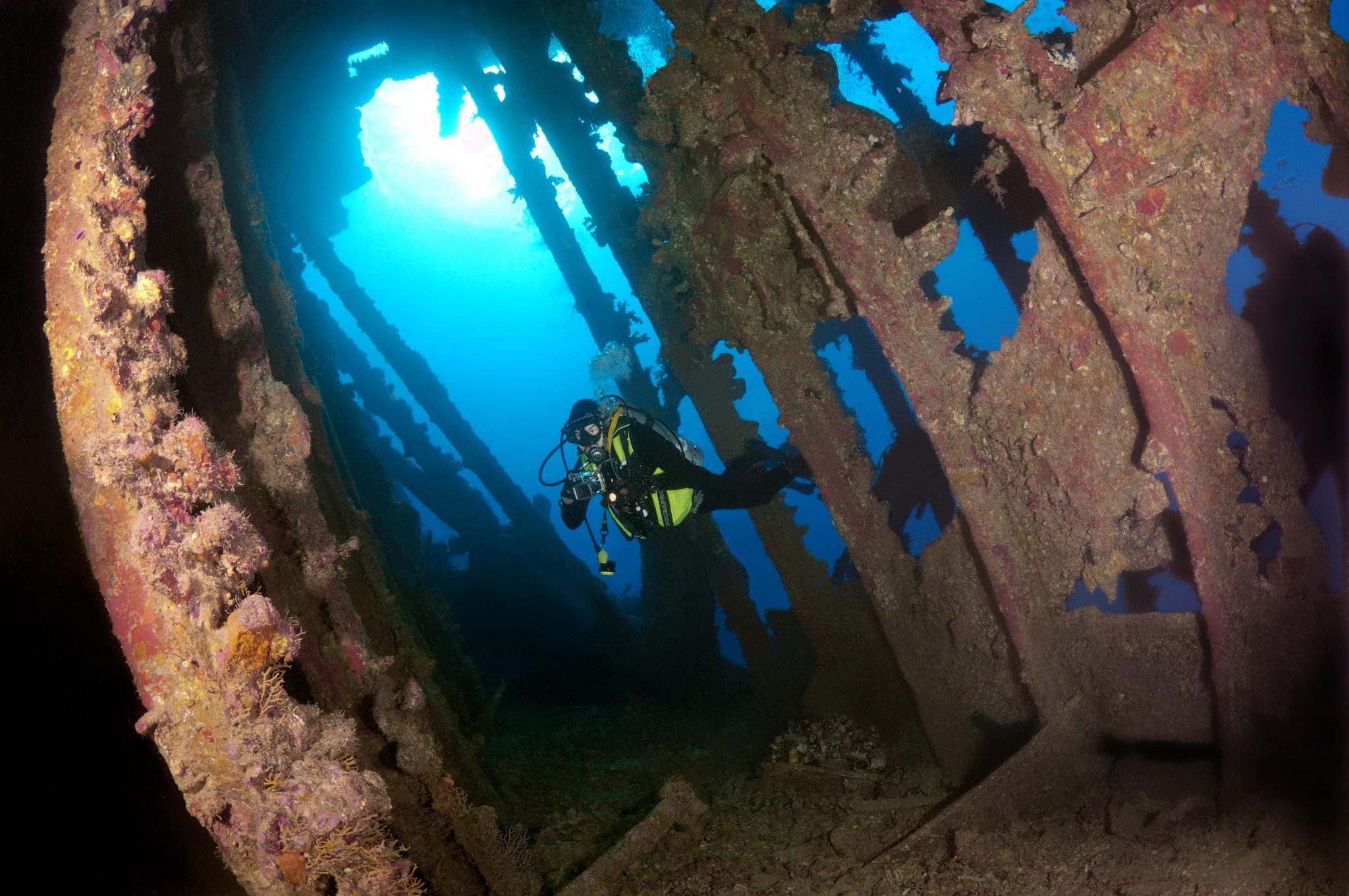
Jake Davies boards Ghazala Explorer for an unforgettable Red Sea diving experience…
The second day’s diving was a day full of wreck diving at Abu Nuhas, which included the Chrisoula K, Carnatic, and Ghiannis D. The first dive of the day was onto the Chrisoula K, also known as the wreck of tiles. The 98m vessel remains largely intact where she was loaded with tiles which can be seen throughout the hold. The stern sits at 26m and the bow just below the surface. One of the highlights of the wreck is heading inside and seeing the workroom where the machinery used for cutting the tiles are perfectly intact. The bow provided some relaxing scenery as the bright sunlight highlighted the colours of the soft coral reef and the many reef fish.
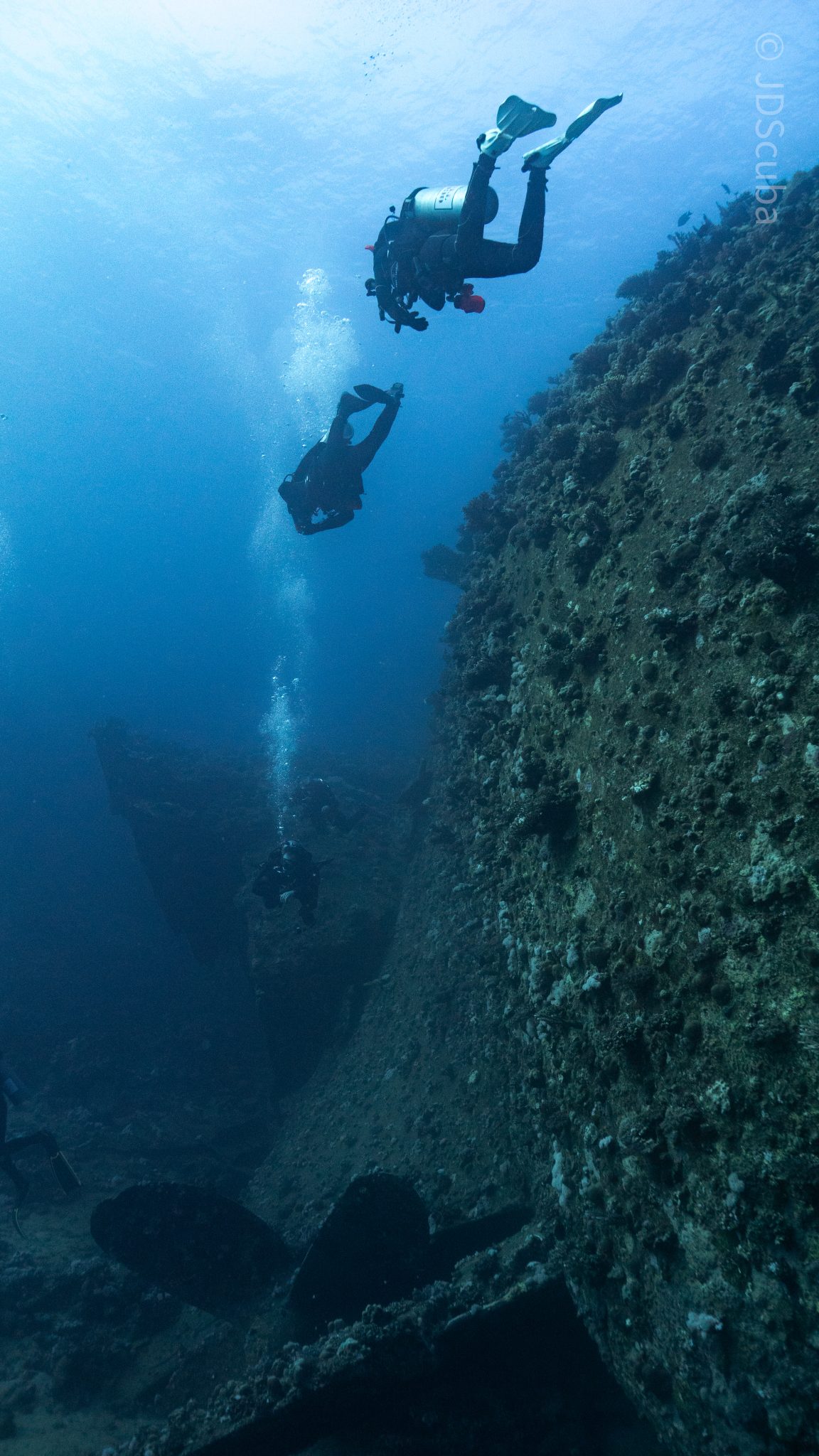
Following breakfast, we then headed to the next wreck, which was the Carnatic. The Carnatic is an 89.9m sail steamer vessel that was built in Britain back in 1862. She ran aground on the reef back in 1869 and remains at 27m. At the time, she was carrying a range of items, including 40,000 sterling in gold. An impressive wreck where much of the superstructure remains, and the two large masts lay on the seafloor. The wooden ribs of the hull provide structures for lots of soft corals, and into the stern section, the light beams through, bouncing off the large shoals of glass fish that can be found using the structure as shelter from the larger predators that are found outside of the wreck.
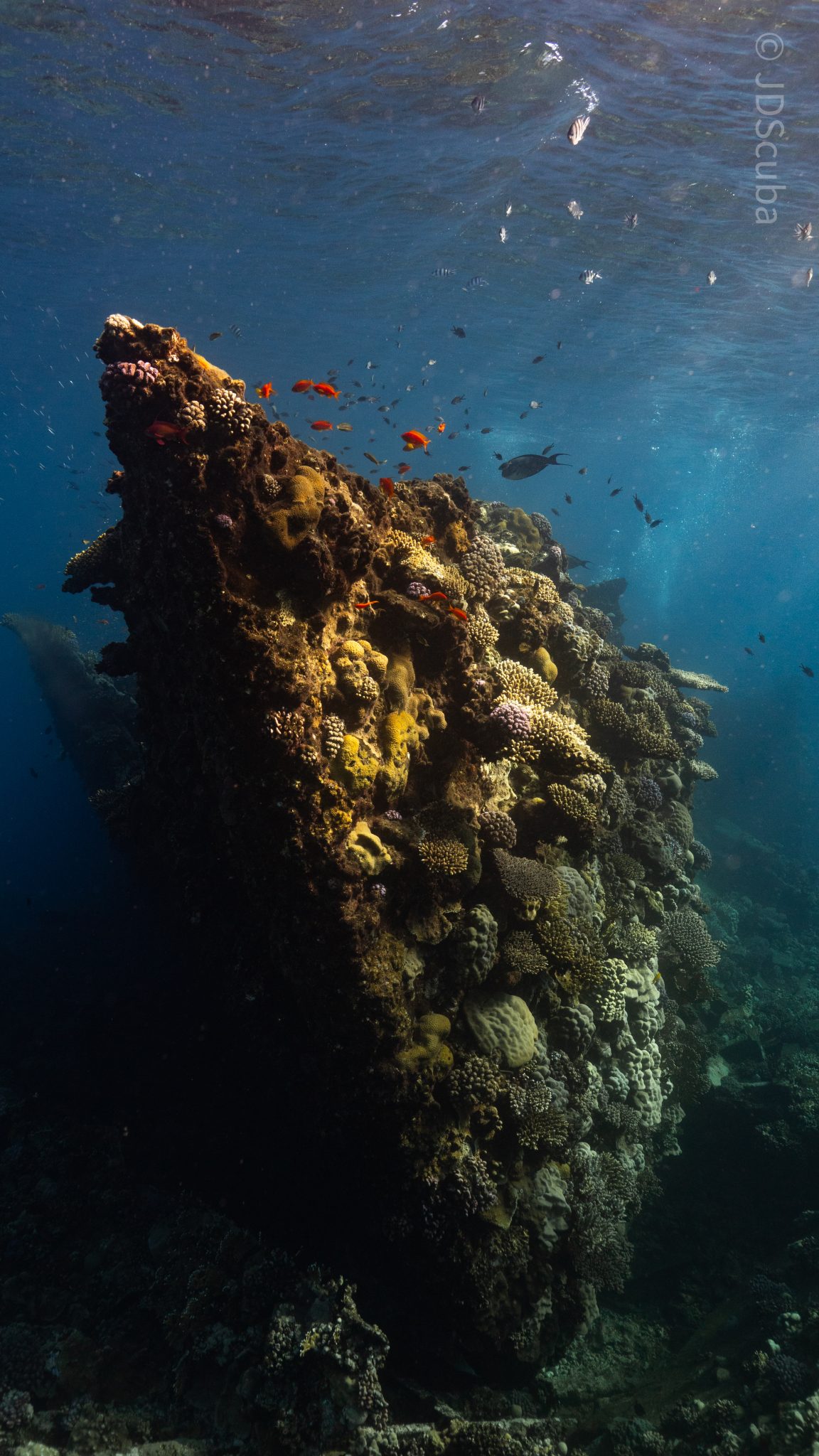
The final wreck at Abu Nuhas was the Ghiannis D, originally called ‘Shoyo Maru,’ which was 99.5m long and built in Japan back in 1969 before becoming a Greek-registered cargo ship in 1980. The ship then ran aground on the reef on April 19th, 1983, and now sits at the bottom at a depth of 27m. Heading down the line, the stern of the ship remains in good condition compared to the rest of the hull. The highlight of the wreck, though, is heading into the stern section and down the flights of stairs to enter the engine room, which remains in good condition and is definitely worth exploring. After exploring the interior section of the ship, we then headed over to see the rest of the superstructure, where it’s particularly interesting to see the large table corals that have grown at the bow relatively quickly considering the date the ship sank. After surfacing and enjoying some afternoon snacks, we made sure everything was strapped down and secured as we would be heading north and crossing the Gulf of Suez, where the winds were still creating plenty of chop.
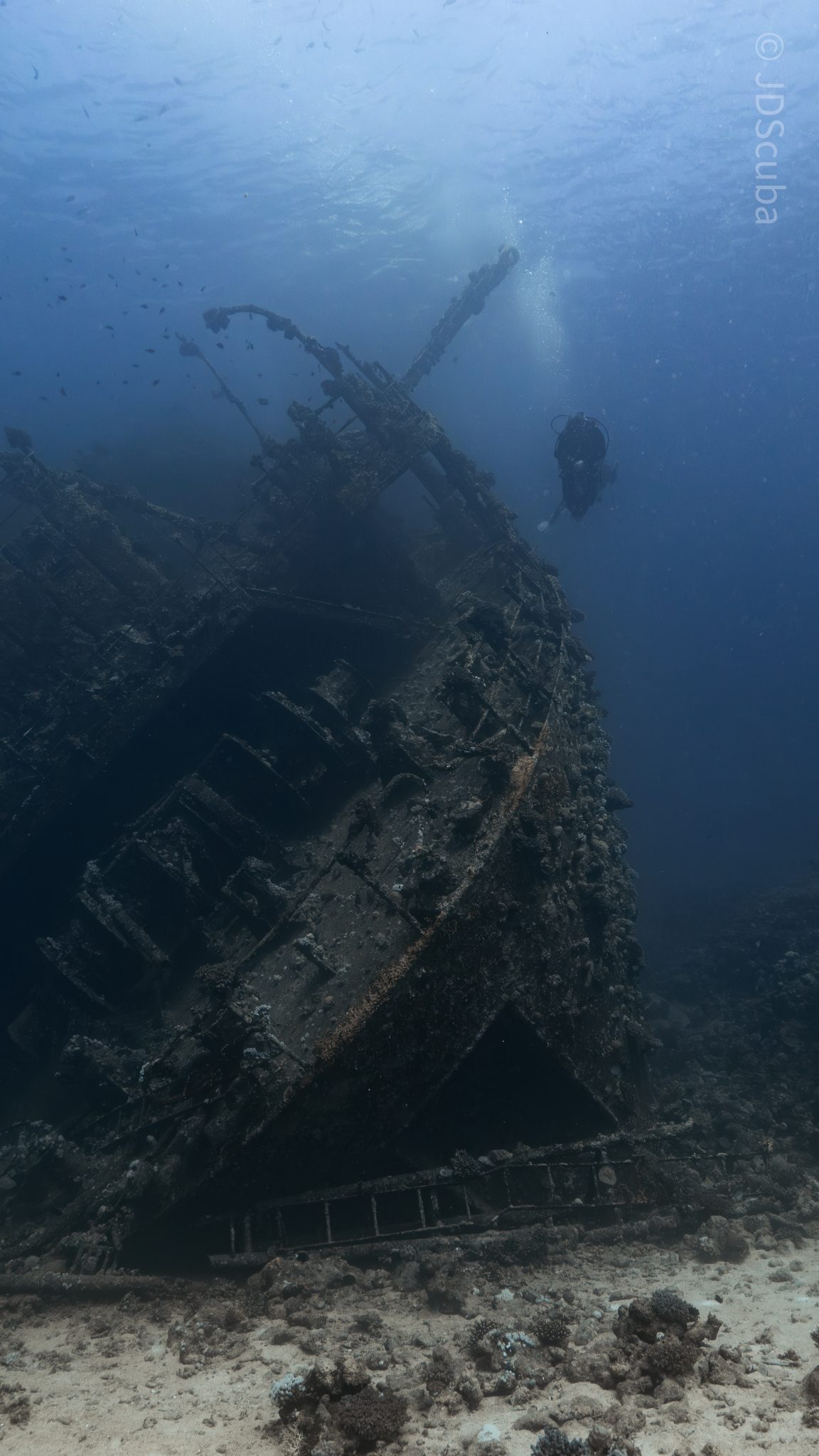
The next morning, it was a short hop to Ras Mohammed Nature Reserve for the next couple of days of diving. The 6am wake-up call came along with the briefing for the first site we would be diving, which was Shark & Yolanda. The low current conditions allowed us to start the dive at Anemone City, where we would drift along the steep, coral-filled wall. These dives involved drifts, as mooring in Ras Mohammed wasn’t allowed to protect the reefs. As a dive site, Shark & Yolanda is well-known and historically had a lot of sharks, but unfortunately not so many in recent years, especially not so early in the season. However, there was always a chance when looking out into the blue.
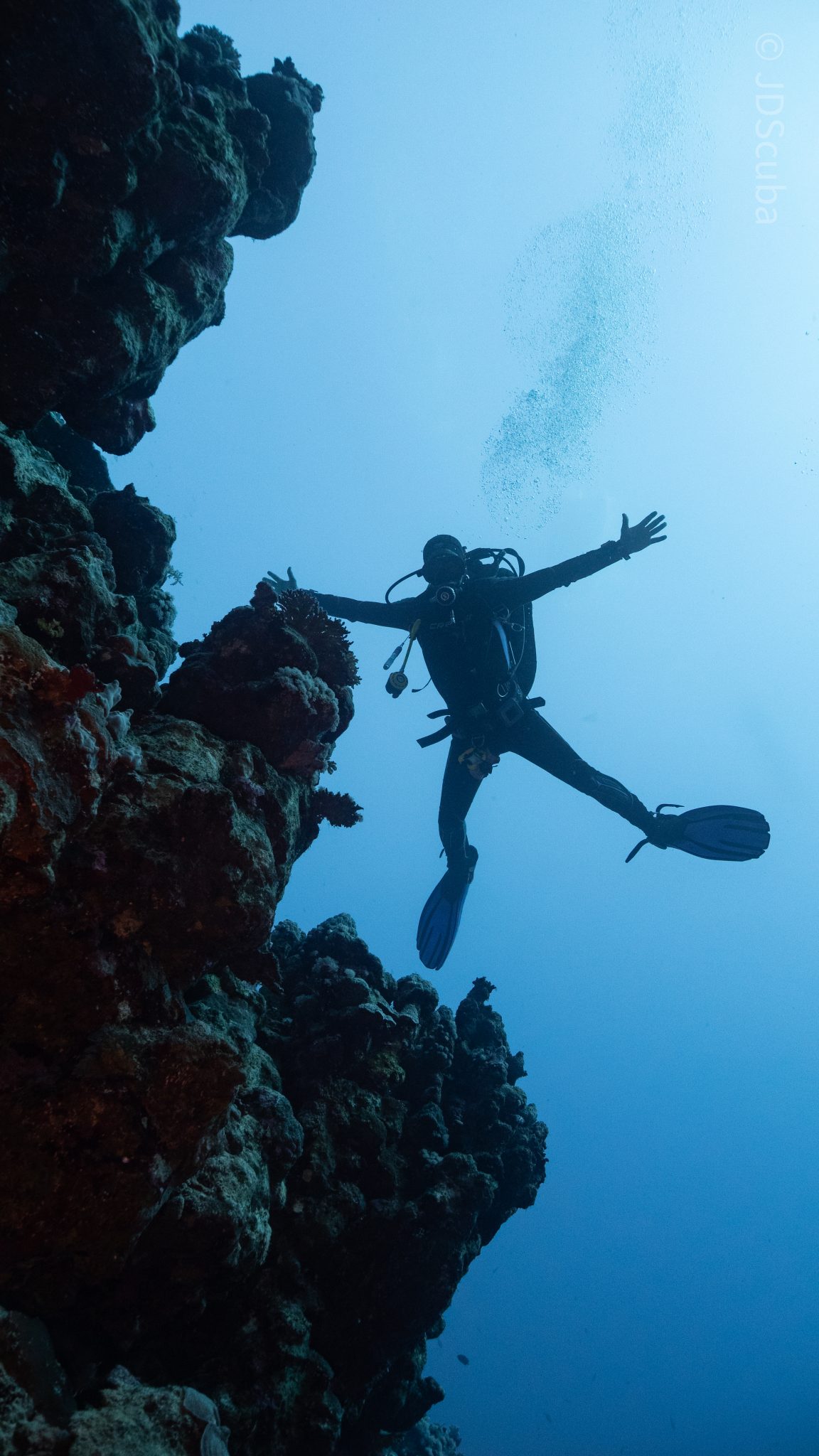
The gentle drift took us along the steep walls of the site, with plenty of anemone fish to be seen and a huge variety of corals. It wasn’t long into the dive before we were accompanied by a hawksbill turtle, who drifted with us between the two atolls before parting ways. Between the two reefs, the shallow patch with parts of coral heads surrounded by sand provided the chance to see a few blue-spotted stingrays that were mainly resting underneath the corals and are always a pleasure to see. With this being the morning dive, the early sunlight lit up the walls, providing tranquil moments. Looking out into the blue, there was very little to be seen, but a small shoal of batfish shimmering underneath the sunlight was a moment to capture as we watched them swim by as they watched us.
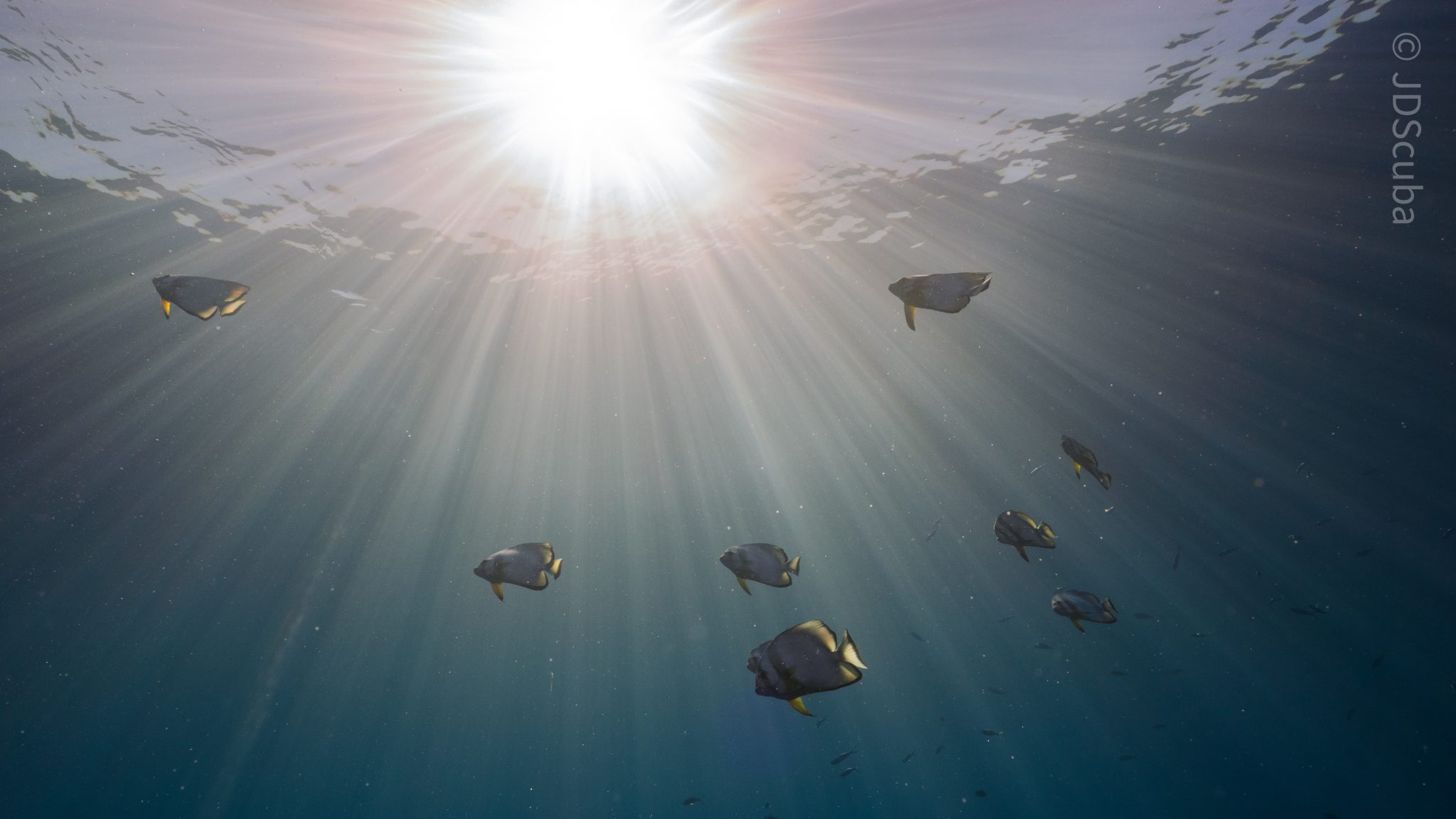
Towards the end of the dive, we stopped at the wreck of the Jolanda where the seafloor was scattered with toilets from the containers it was carrying. This provided a unique site to make a safety stop, which was also accompanied by a large barracuda slowly swimming by, along with a hawksbill turtle calmly swimming over the reef as the sun rays danced in the distance.
For the next dive, we headed north to the Strait of Tiran to explore the reefs situated between Tiran Island and Sharm El Sheik, which were named after the British divers who had found them. We started on Jackson before heading to Gordons Reef, where we also did the night dive. All the atolls at these sites provided stunning, bustling coral reefs close to the surface and steep walls to swim along, which always provided the opportunity to keep an eye out for some of the larger species that can be seen in the blue. Midwater around Jackson Reef was filled with red-toothed triggerfish and shoals of banner fish, which at times were so dense that you couldn’t see into the blue. Moments went by peacefully as we enjoyed the slow drift above the reef, watching these shoals swim around under the mid-afternoon sun.
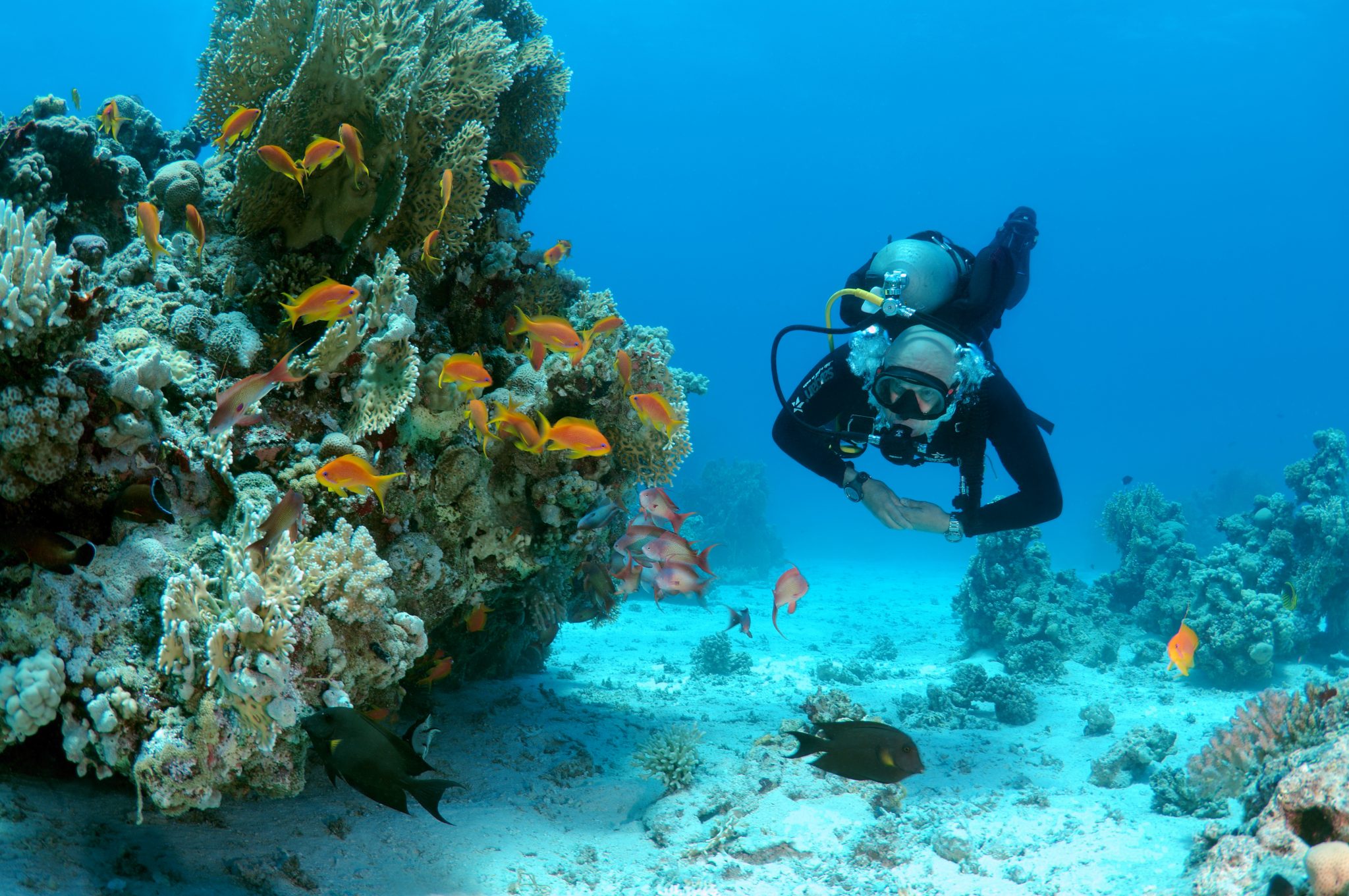
The night dive at Gordon’s Reef was mainly among the stacks of corals surrounded by sand, which was great to explore under the darkness. After some time circling the corals, we came across what we were really hoping to find, and that was an octopus hunting on the reef. We spent the majority of the dive just watching it crawl among the reef, blending into its changing surroundings through changes in colour and skin texture. It’s always so fascinating and captivating to watch these incredibly intelligent animals, in awe of their ability to carry out these physical changes to perfectly blend into the reef. Before we knew it, it was time to head back to the boat to enjoy a well-deserved tasty dinner prepared by the talented chefs onboard.
Check in for the 3rd and final part of this series from Jake tomorrow!
To find out more about the Northern Red Sea reef and wrecks itineraries aboard Ghazala Explorer, or to book, contact Scuba Travel now:
Email: dive@scubatravel.com
Tel: +44 (0)1483 411590
Photos: Jake Davies / Avalon.Red
Marine Life & Conservation
Double Bubble for Basking Sharks

 The Shark Trust is excited to announce that, for two more days only, all donations, large or small, will be doubled in the Big Give Green Match Fund!
The Shark Trust is excited to announce that, for two more days only, all donations, large or small, will be doubled in the Big Give Green Match Fund!
Donate to Basking in Nature: Sighting Giants
The Shark Trust is hoping to raise £10k which will be doubled to £20k. This will go towards Basking in Nature: Sighting Giants. And they need YOUR help to reach they’re goal.
The Shark Trust’s citizen science project is to monitor and assess basking sharks through sightings; encouraging data collection, community engagement, and promoting nature accessibility. This initiative aims to enhance health and wellbeing by fostering a deeper connection with British Sharks.
Campaign Aims
- Increase citizen science reporting of Basking Sharks and other shark sightings to help inform shark and ray conservation.
- Provide educational talks about the diverse range of sharks and rays in British waters and accessible identification guides!
- Create engaging and fun information panels on how to ID the amazing sharks and rays we have on our doorstep! These can be used on coastal paths around the Southwest. With activities and information on how you can make a difference for sharks and rays!
- Promote mental wellbeing through increasing time in nature and discovering the wonders beneath the waves!
Donate, and double your impact. Click Here
-

 News3 months ago
News3 months agoHone your underwater photography skills with Alphamarine Photography at Red Sea Diving Safari in March
-

 News3 months ago
News3 months agoCapturing Critters in Lembeh Underwater Photography Workshop 2024: Event Roundup
-

 Marine Life & Conservation Blogs2 months ago
Marine Life & Conservation Blogs2 months agoCreature Feature: Swell Sharks
-

 Blogs2 months ago
Blogs2 months agoMurex Resorts: Passport to Paradise!
-

 Blogs2 months ago
Blogs2 months agoDiver Discovering Whale Skeletons Beneath Ice Judged World’s Best Underwater Photograph
-

 Gear Reviews2 months ago
Gear Reviews2 months agoGear Review: Oceanic+ Dive Housing for iPhone
-

 Marine Life & Conservation2 months ago
Marine Life & Conservation2 months agoSave the Manatee Club launches brand new webcams at Silver Springs State Park, Florida
-

 News3 months ago
News3 months agoWorld’s Best Underwater Photographers Unveil Breathtaking Images at World Shootout 2023


